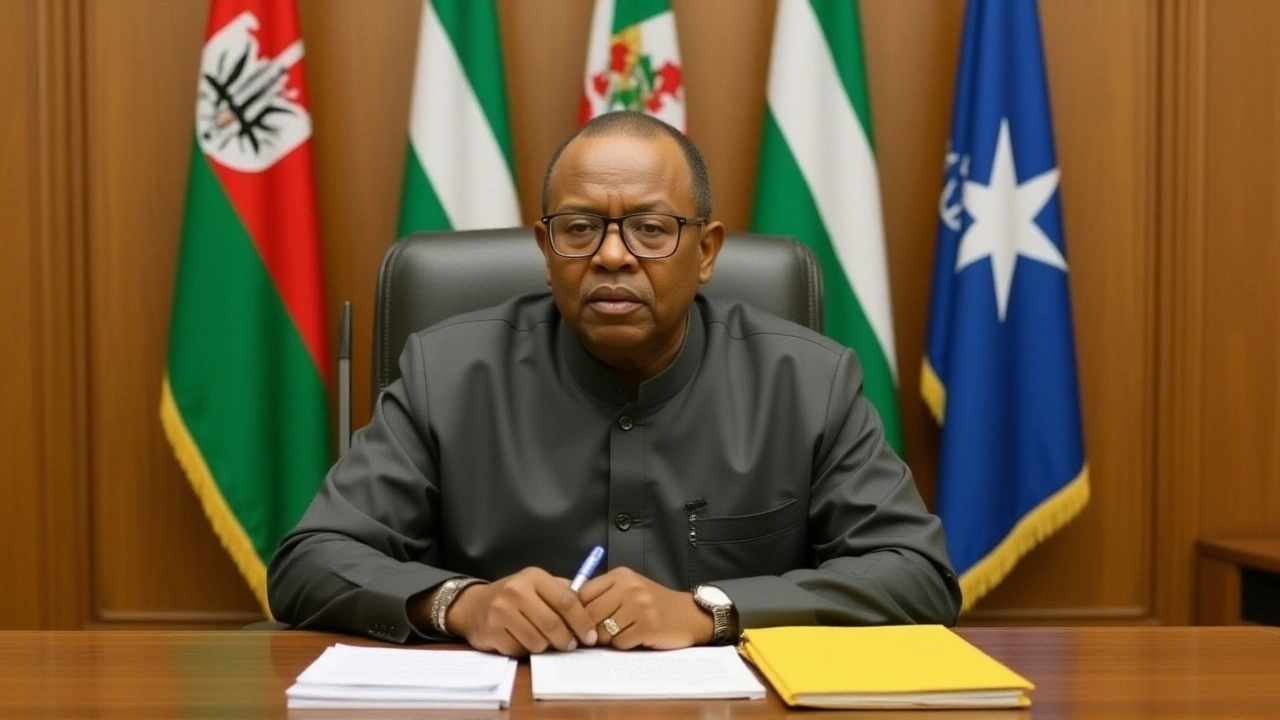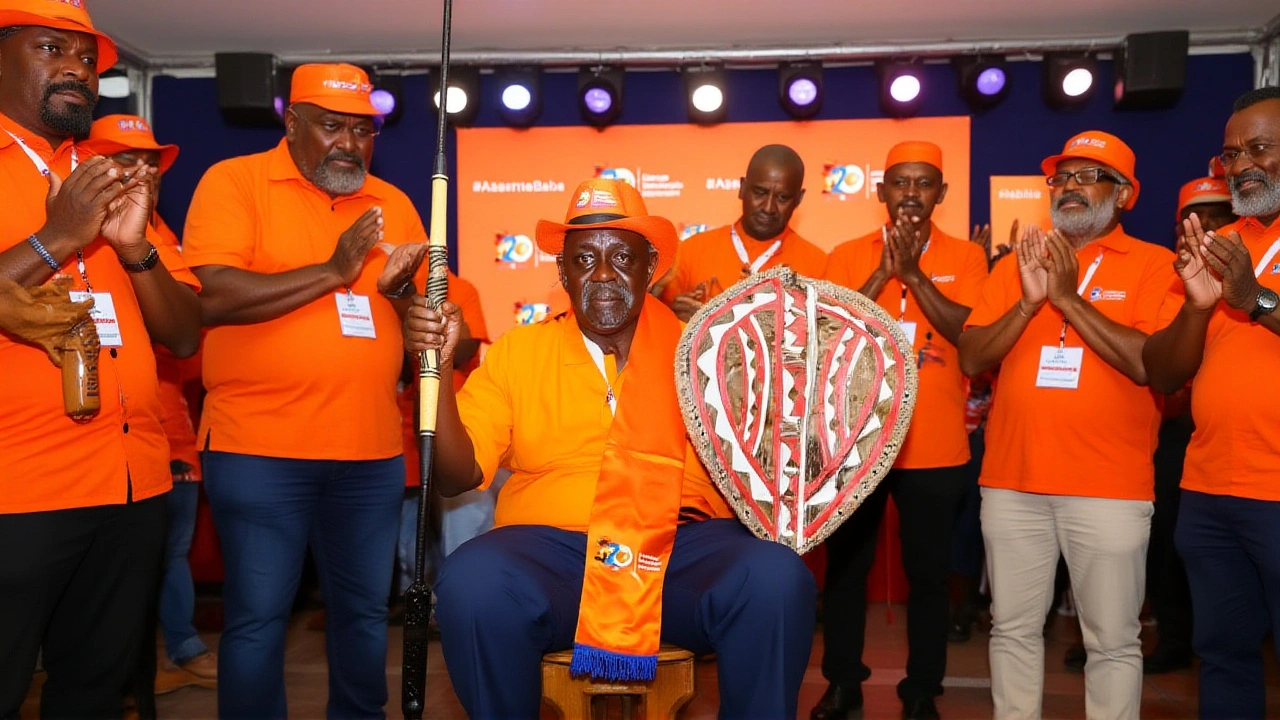On November 18, 2025, a group of Orange Democratic Movement life members, led by Rachael Tabitha, delivered a formal petition to the party’s National Elections Board demanding the immediate resignation of Oburu Odinga as party leader. Their message was blunt: step down, or they walk. And they meant it. With a 30-day deadline set for December 18, 2025, these veterans — many of whom helped build ODM from the ground up in 2005 — are threatening to resign en masse, calling the current leadership a betrayal of the party’s soul.
The Constitution Wasn’t Just a Document — It Was Their Covenant
The petitioners didn’t just complain. They cited Article 6.2.2(b) of the ODM constitution, a clause that explicitly forbids leaders from sidelining members, bypassing due process, or acting unilaterally on matters of party direction. According to them, Oburu Odinga and a small inner circle have done exactly that. They point to the recent handling of ODM’s relationship with President William Ruto’s United Democratic Alliance (UDA) coalition government as proof. No consultative meetings. No grassroots input. Just decisions made behind closed doors."We were there when Raila Odinga walked out of the 2007 election with blood on his hands," one petition signer told Maisha TV. "We lost jobs, homes, even friends for this party. Now we’re told to sit quietly while someone who never ran for office under ODM’s banner decides our fate? That’s not leadership. That’s appropriation."
Winnie Odinga’s Bombshell and the Family Fracture
The cracks had been showing for weeks. On November 15, 2025, during ODM’s 20th anniversary gala in Mombasa, Winnie Odinga dropped a political grenade. Speaking to a room full of party elders and media, she said the party’s participation in the broad-based government needed a "fresh mandate" from members — not a whisper from the Odinga family dining table.Oburu’s response? "I want to tell Winnie that we will speak about that in private, at home." The comment didn’t just fall flat — it ignited fury. To many, it wasn’t a domestic aside. It was a declaration that ODM’s political direction was being treated like family business, not public governance.
Insiders say Winnie’s remarks reflect a wider unease. One anonymous Odinga family source told a Nairobi-based journalist: "Kisumu Governor Anyang' Nyong'o is seen as more suitable. He’s built alliances, not dynasties. Oburu doesn’t have the party’s trust — only its name."
Who’s Standing With the Life Members?
The rebellion isn’t isolated. James Orengo, governor of Siaya, publicly backed the call for a National Delegates Convention (NDC). "ODM’s strength has always been its grassroots," he said. "We can’t negotiate our future with the presidency without consulting the people who put us here."Even Edwin Sifuna, the party’s Secretary-General, echoed the sentiment — a rare public break from the leadership line. "The NDC isn’t optional," he insisted. "It’s constitutional. And ignoring it isn’t strategy — it’s suicide."
Meanwhile, the petitioners — 147 signed names, many in their 60s and 70s — are framing themselves as the last guardians of Raila Odinga’s original vision. "He called us the foundation," said Tabitha. "He shook our hands at rallies in 2005 and told us we were the heartbeat. Now we’re being treated like ghosts."

The 2027 Election Shadow
This isn’t just about personality clashes. It’s about survival. With the 2027 general elections looming, ODM’s ability to mount a credible challenge against UDA depends on unity. But right now, the party is split: one wing wants to keep the coalition, believing it delivers tangible benefits to western Kenya. The other — the life members — argues that ODM is losing its identity, becoming a junior partner in a government it once opposed.Analyst Lee Makwiny put it bluntly in a November 18 YouTube breakdown: "You can’t be both a coalition member and a liberation movement. The structures are there — the NDC, the delegates, the constitution. If Oburu won’t use them, someone else will. And they will."
The timing couldn’t be worse. The anniversary celebration in Mombasa was meant to be a moment of unity. Instead, it became a funeral for internal trust. Party offices in Nairobi are reportedly bracing for mass resignations. Local chapters in Kakamega, Kisumu, and Bungoma are already holding informal meetings to discuss next steps.
What Happens If Oburu Stays?
If Oburu Odinga ignores the ultimatum, the consequences could be catastrophic. Hundreds of life members — many of whom still hold influence in county politics and local fundraising — will walk. That’s not just a PR blow. It’s a financial and organizational hemorrhage. ODM’s grassroots networks, built over two decades, could collapse faster than anyone admits.And if the National Elections Board fails to act? The petitioners say they’ll take their case to the courts — invoking Kenya’s Political Parties Act and the party’s own constitution as binding legal instruments. That could trigger a judicial review of ODM’s leadership structure, potentially invalidating Oburu’s tenure.
For now, the ball is in the Board’s court. But the real power? It’s in the hands of the people who remember when ODM was more than a political brand — it was a movement.
Frequently Asked Questions
Why are life members so important to ODM’s legitimacy?
Life members were personally recruited and acknowledged by Raila Odinga during ODM’s founding in 2005. Many risked their careers, faced state harassment, and funded early campaigns out of pocket. Their signatures carry moral weight — and their departure would signal that the party has abandoned its founding principles, undermining its credibility with voters ahead of 2027.
What is the National Delegates Convention (NDC), and why is it non-negotiable?
The NDC is ODM’s highest decision-making body, as defined in Article 6.2.2(b). It brings together elected delegates from every constituency to vote on leadership, alliances, and policy. Bypassing it violates the party’s own constitution. The life members argue that without an NDC, Oburu’s authority is illegitimate — not because he’s unpopular, but because he never sought formal mandate from the party’s base.
Could Anyang' Nyong'o replace Oburu Odinga as leader?
While Nyong'o hasn’t declared his candidacy, he’s widely seen as the most viable alternative. He has broad support across ODM’s western Kenya base, a proven record of coalition-building, and no direct ties to the Odinga family’s internal dynamics. His name is being floated by party insiders precisely because he represents continuity without dynastic control — a key demand of the life members.
What happens if the National Elections Board ignores the petition?
The life members have threatened to file a legal challenge under Kenya’s Political Parties Act, arguing that ODM’s leadership structure is being unlawfully subverted. If the courts intervene, Oburu’s position could be suspended pending an audit of party governance. Even the threat of litigation has already shaken party fundraising and donor confidence.
How does this affect ODM’s chances in the 2027 elections?
A fractured ODM is a weakened ODM. If life members leave, so do their networks — volunteers, donors, and local organizers. Meanwhile, voters in western Kenya are watching closely. If ODM appears to be ruled by family politics rather than democratic process, support could shift to newer parties like PAA or even UDA. The 2027 election isn’t just about candidates — it’s about trust, and right now, ODM is losing it.
Is this conflict unique, or has ODM faced similar crises before?
Yes. In 2013, after Raila Odinga lost the presidential election, a similar group of elders demanded a leadership review, fearing the party was becoming too centralized. Raila responded by convening an NDC, which reaffirmed his leadership — but also strengthened internal checks. This time, the leadership refuses to engage. That refusal may be the real crisis.

